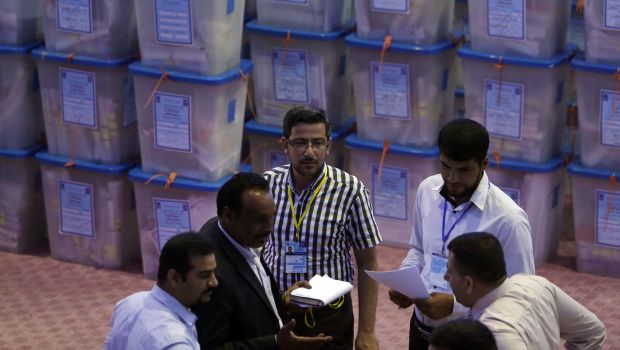
Election commission officials stand near ballot boxes as they talk during the counting of votes in the central city of Karbala on May 2, 2014, following the country’s general elections. (AFP/Mohammed Sawaf)
Baghdad, Asharq Al-Awsat—As the Independent Higher Electoral Commission (IHEC) continues the difficult task of counting Iraqis’ votes, the post-election political scene remained fractured as parties began the potentially lengthy process of forming a coalition that will then form a government.
Speaking to reporters one day after the elections, Iraqi Prime Minister Nuri Al-Maliki repeated claims that his State of Law coalition had secured victory, adding that he had already secured enough support to build a coalition government.
Maliki’s allies had earlier claimed that the State of Law coalition had secured at least 90 seats in parliament, and the prime minister had told reporters that “we have an ability to pass the 165 seat mark,” the threshold required to form a majority government.
“We are confident that we will achieve a political majority,” Maliki added. However the prime minister is facing a difficult task, particularly after Shi’ite allies abandoned him in the run up to the elections.
Maliki was able to secure a second term in office in 2010 only after forming a National Alliance comprising the Sadrist Movement and the Islamic Supreme Council of Iraq (ISCI).
Both parties have strongly criticized Maliki’s leadership in recent months, and particular his handling of the security crisis that has engulfed the country, in particular the western province of Anbar.
Sadrist Movement leader Moqtada Al-Sadr called the prime minister as a “tyrant” and “dictator” during the campaign season, while ISCI leader Ammar Al-Hakim called on the country’s security leadership to “acknowledge their mistakes and submit their resignations.”
Hakim’s statement was a veiled criticism of Maliki, who has been Iraq’s acting minister of the interior, defense and national security since 2010.
In a statement released by the Furat news website on Friday, Hakim said: “I advise all brothers and partners in doctrine, religion and homeland to work together as responsible statesmen and keep away from selfishness, narcissism and prejudice,” in comments that could again be taken as an implicit criticism of the Maliki government.
Hakim claimed that the ISCI had also secured a strong turnout across the country, which could put Maliki in a difficult position—particularly if Hakim refuses to join forces with his former ally.
The Sunni-led Mutahidoun Coalition also claimed to have secured a large number of seats in the April 30 poll. The bloc, which is led by Iraqi Parliamentary Speaker Osama Al-Nujaifi, told local media that it had secured a strong turnout in Anbar, where government and tribal forces have been combatting an Al-Qaeda-inspired insurgency led by the militant Islamic State of Iraq and Syria (ISIS).
The mayor of Nineveh, Athil Al-Nujaifi, called for Iraq’s Sunni political forces to stand together.
“Mutahidoun calls on all the winning lists in the Sunni areas to engage in dialogue and unify their positions, in accordance with people’s aspirations.”
Athil Al-Nujaifi, who is the Mutahidoun leader’s brother, also stressed the need for “the presence of a shared vision among all forces to prevent the emergence of a new Maliki premiership.”
